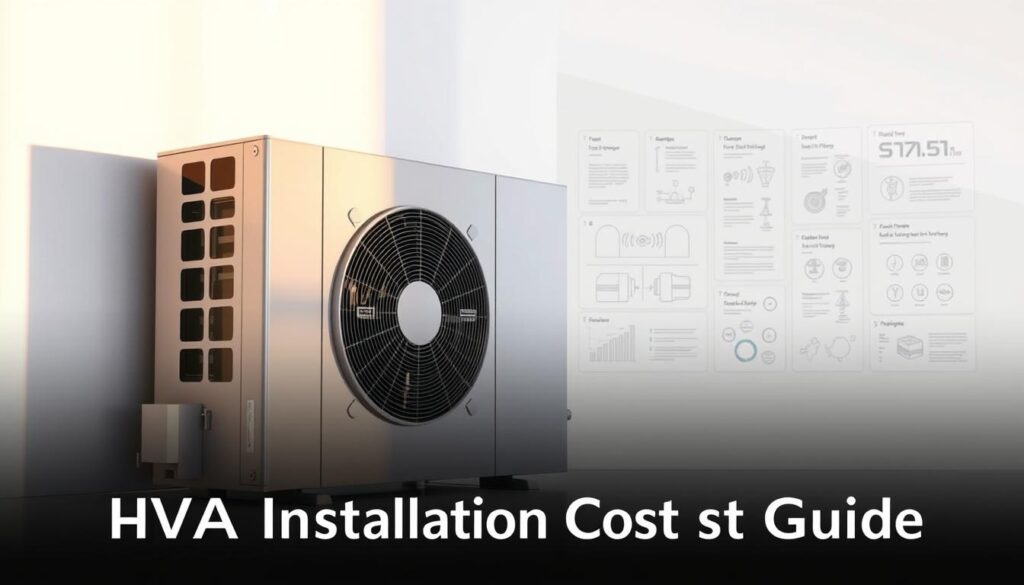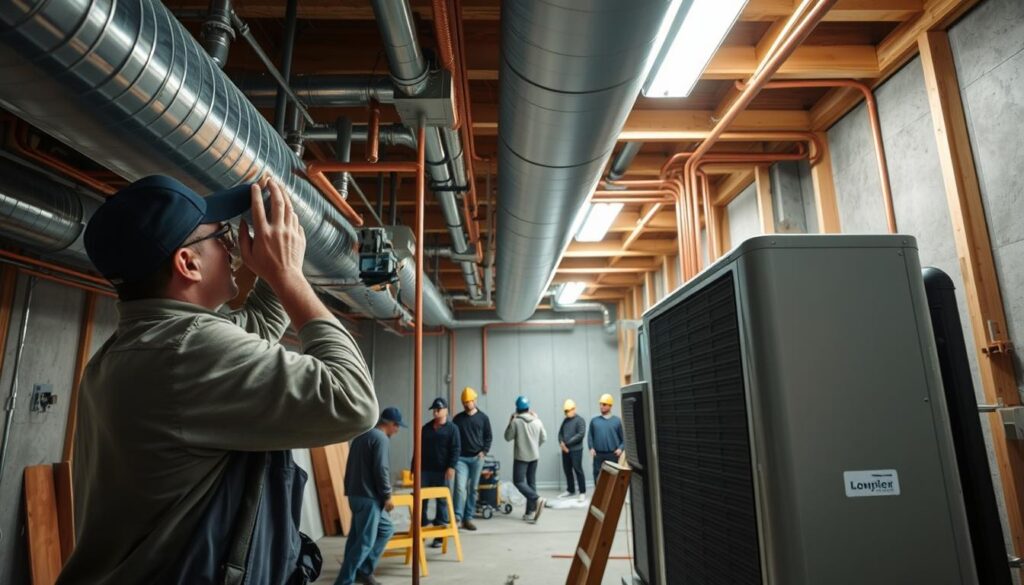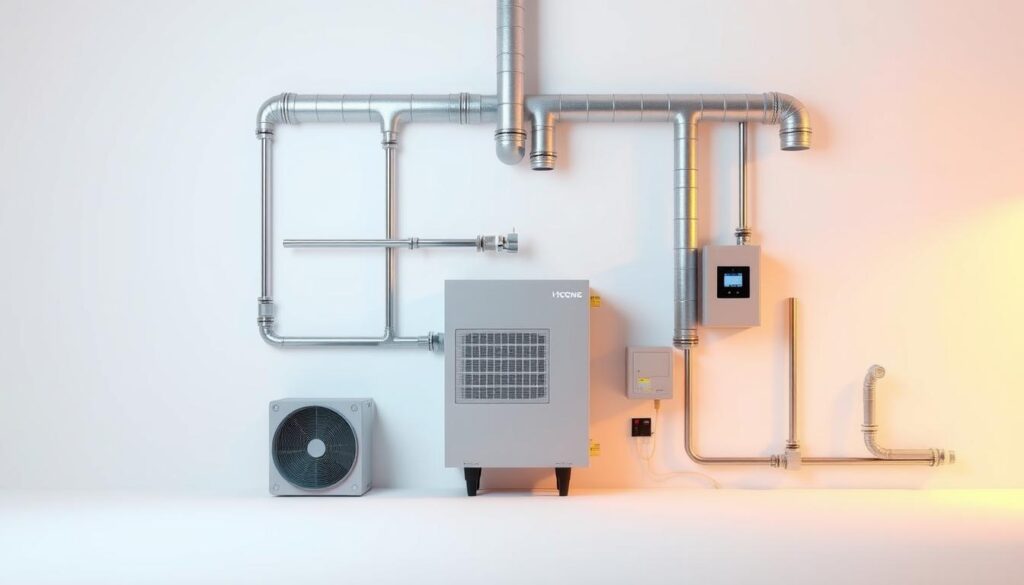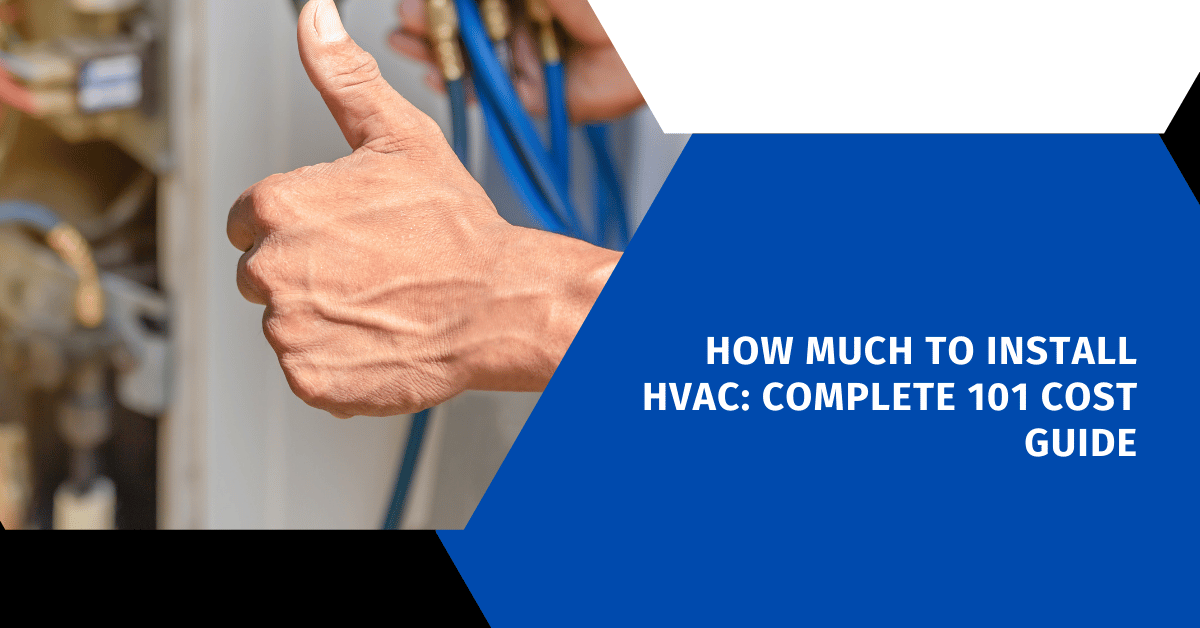Affiliate Disclosure
HVAC Guide Guys is a participant in the Amazon Services LLC Associates Program, an affiliate advertising program designed to provide a means for sites to earn advertising fees by advertising and linking to Amazon.
How Much to Install HVAC? Are you curious about the cost of a new HVAC system for your home? The world of HVAC installation can be confusing. It’s filled with different prices and choices that might confuse homeowners.

Knowing the cost of HVAC installation is key to making a smart choice. In the U.S., homeowners face costs from $2,500 to $45,000. This range depends on your home, the local weather, and what you need for comfort.
This guide will help you understand all the costs of HVAC installation. It will make you feel more confident when deciding on your investment.
Key Takeaways
- HVAC installation costs vary widely based on multiple factors
- Home size and system complexity directly impact pricing
- Energy efficiency can influence long-term financial benefits
- Professional assessment is critical for accurate cost estimation
- Regional climate plays a significant role in system selection
- Financing options can help manage upfront expenses
Table of Contents
Understanding HVAC System Basics
Your home’s heating and cooling system cost depends on knowing how HVAC technology works. These systems keep your home comfortable by controlling temperature, humidity, and air quality. They do this through heating, cooling, and ventilation.
HVAC systems are a big investment for homes. The cost to install them varies based on the system’s complexity and type. Let’s look at what makes these systems great for home comfort.
Types of HVAC Systems
Homeowners have many HVAC system options:
- Central Air Conditioning Systems
- Ductless mini-split systems
- Heat Pump Systems
- Geothermal HVAC Systems
- Hybrid heating systems
Key Components of HVAC Systems
Knowing the main parts helps you understand the cost of your system:
| Component | Function | Average Lifespan |
|---|---|---|
| Thermostat | Temperature control and system regulation | 10-15 years |
| Furnace | Heating air distribution | 15-20 years |
| Air Conditioner | Cooling and humidity control | 10-15 years |
| Air Handler | Circulating conditioned air | 10-15 years |
Importance of Proper HVAC Installation
Proper installation is key for your system’s efficiency and life. Professional installation ensures optimal performance. It helps avoid problems that could raise installation costs later.
Choosing the right system means looking at your home’s needs, local climate, and energy efficiency goals.
Explore Our HVAC Shop
Looking for top-rated HVAC tools, parts, and accessories? Visit our shop and find the perfect solution for your needs.
Visit the ShopHow Much to Install HVAC: Breaking Down the Costs
Knowing the average cost for a new HVAC system helps you plan your budget. The price for central air conditioning varies a lot. It’s important to look at your options carefully.
Different HVAC systems have different prices. This can greatly affect how much you spend. Here’s a detailed breakdown of typical installation costs:
| HVAC System Type | Price Range |
|---|---|
| Gas Furnace | $3,800 – $12,000 |
| Central Air Conditioning | $3,000 – $15,000 |
| Heat Pump | $6,000 – $25,000 |
| Ductless mini-splits | $2,000 – $10,500 |
| Oil Furnace | $2,500 – $10,000 |
| Geothermal Heat Pump | $12,000 – $45,000 |
Things that affect your HVAC installation costs include:
- System capacity and efficiency ratings
- Brand reputation and quality
- Home size and layout complexity
- Regional climate requirements
Your specific central air conditioning installation price will depend on these unique factors. Homeowners should get multiple quotes. Also, think about long-term energy efficiency and initial installation costs.
Factors Affecting Installation Costs
Knowing what affects hvac installation cost helps you plan better for your home’s comfort system. Many factors influence the cost of replacing your furnace and AC.
Your HVAC system’s price varies based on several important factors. These factors can greatly change the total cost:
- Home size and structural complexity
- Regional climate conditions
- Equipment quality and manufacturer selection
- Existing ductwork and infrastructure
Home Size and Layout Considerations
The size of your home affects the cost of hvac installation. Bigger homes need more powerful systems, which costs more. Unique features like high ceilings or complex layouts can also raise the price.
Regional Climate Impact
Your local climate is key in determining furnace and AC replacement cost. Areas with extreme weather need stronger HVAC systems. Harsh winters or hot summers mean you’ll need more powerful equipment, which costs more to install.
Equipment Quality and Brand Selection
Choosing the right HVAC system is about finding a balance between quality and cost. High-end brands might be pricier but offer better energy efficiency and last longer. Think about the long-term savings when considering the initial cost.
Investing in a high-quality HVAC system can reduce future maintenance and energy expenses.
Labor Costs and Installation Timeline

When you’re planning to upgrade your HVAC system, knowing the costs is key. HVAC contractors usually charge between $50 and $150 per hour. The total labor cost will depend on your project’s details.
The cost for labor in HVAC installation varies based on a few important factors:
- Complexity of the installation
- Type of HVAC system being installed
- Geographic location
- Contractor’s experience level
The time it takes to install your HVAC system can be one to three days. This depends on the system’s complexity and your home’s layout. Here’s what a typical installation involves:
- Initial site assessment
- Equipment removal (if replacing existing system)
- New system preparation
- Ductwork modifications
- System installation
- Final testing and calibration
Getting a professional to install your HVAC system is vital. They ensure it works well and meets local codes. This can save you money on repairs later on.
Investing in quality installation is as important as selecting the right HVAC system.
When planning your budget, remember labor costs are about 40-60% of the total. Get quotes from several licensed contractors to find the best price.
Explore Our HVAC Shop
Looking for top-rated HVAC tools, parts, and accessories? Visit our shop and find the perfect solution for your needs.
Visit the ShopEnergy Efficiency Ratings and Long-term Savings
When thinking about installing HVAC, knowing about energy efficiency is key. Energy-efficient systems might cost more at first, but they save a lot of money in the long run for homeowners.
Choosing an energy-efficient HVAC system is more than just the initial cost. It affects your yearly energy bills and how comfortable your home is.
SEER Ratings Explained
SEER (Seasonal Energy Efficiency Ratio) ratings show how well your air conditioning works. It’s like the miles per gallon for your car, but for cooling. Higher SEER ratings mean:
- Better energy saving
- Less electricity used
- Less harm to the environment
“A high-efficiency HVAC system can cut energy bills by up to 20-40%.” – Energy Star Research
Annual Energy Cost Calculations
To figure out energy savings, compare different HVAC systems. A system with a higher SEER rating might cost more at first. But, it can save you a lot on your monthly bills.
Return on Investment Analysis
When deciding on HVAC installation, think about the long-term savings. An energy-efficient system might cost more upfront. But, it saves money over time by using less energy.
- Average energy savings: 15-25% annually
- Potential system payback period: 5-7 years
- Increased home value
Choosing the right energy-efficient HVAC system needs careful thought. Consider your home’s needs, local climate, and budget.
Additional Installation Expenses

When you plan your HVAC installation, remember it’s not just the system itself. There are hidden costs that can add up. Knowing these extra charges helps you budget better and avoid surprises.
Ductwork costs can vary a lot, depending on your home. Older homes or those needing big changes might cost more. Here are some extra costs you might face:
- Ductwork Modifications: $1,500 to $7,000
- Electrical System Upgrades: $200 to $2,000
- Thermostat Installations: $100 to $300
What affects your ductwork costs includes:
- Home age and duct condition
- How much space needs duct changes
- How easy it is to reach the ducts
- Insulation needs
| Expense Category | Typical Cost Range | Key Considerations |
|---|---|---|
| Ductwork Modifications | $1,500 – $7,000 | Home layout, material quality, labor complexity |
| Electrical Upgrades | $200 – $2,000 | Existing electrical panel capacity, new system requirements |
| Smart Thermostat Installation | $100 – $300 | Technology complexity, integration with existing systems |
Pro tip: Always get multiple quotes and discuss possible extra costs with your HVAC expert to avoid going over budget.
Explore Our HVAC Shop
Looking for top-rated HVAC tools, parts, and accessories? Visit our shop and find the perfect solution for your needs.
Visit the ShopChoosing the Right HVAC System Size
Finding the right HVAC system size is key to a good home heating and cooling system cost. Professional installers know that one size doesn’t fit all. They understand that each home has its own needs.
BTU Calculations: The Foundation of Proper Sizing
BTU (British Thermal Unit) calculations are vital for figuring out your home’s heating and cooling needs. They show how much energy is needed to keep your home at a comfortable temperature.
- 1 BTU = Amount of heat required to raise one pound of water by 1 degree Fahrenheit
- Typical home HVAC systems range from 18,000 to 60,000 BTUs
- Factors influencing BTU requirements include:
- Home square footage
- Ceiling height
- Insulation quality
- Window placement
Square Footage and Climate Considerations
Your home’s size affects the cost of heating and cooling. Experts use exact measurements to suggest the best HVAC system for you.
| Home Size | Recommended BTUs | Estimated Cost Range |
|---|---|---|
| 500-1000 sq ft | 18,000-24,000 | $3,000-$5,000 |
| 1000-1500 sq ft | 24,000-30,000 | $4,500-$7,000 |
| 1500-2000 sq ft | 30,000-36,000 | $6,000-$9,000 |
“Proper HVAC sizing is not just about comfort—it’s about efficiency and long-term savings.” – HVAC Industry Expert
Remember, the right HVAC size is important for saving money and extending your system’s life. Always get a professional to do detailed calculations for your home.
Installation Requirements and Permits
When you plan to install a new HVAC system, knowing about local permits is key. Getting the right permits can affect your cost and make sure your system is safe.
Different places have their own rules for HVAC setups. It’s important to follow these rules to avoid legal issues or fines.
- Check local building department requirements
- Verify specific permit documentation needed
- Understand inspection schedules
- Budget for permit fees
Permit fees for HVAC installations usually cost between $100 and $500. These prices change based on where you live and how complex your system is. Some things to think about include:
- Zoning regulations
- Electrical and mechanical codes
- Environmental restrictions
- Property-specific requirements
Most HVAC pros handle the permit process for you. They know the local rules and can make things easier. This ensures your installation is legal and safe.
“Proper permits are not just a legal requirement, but a guarantee of quality and safety for your home’s HVAC system.”
Spending time on permits can save you from problems later. It makes your HVAC installation go smoothly.
Financing Options and Payment Plans
Getting a new HVAC system can cost a lot. But, there are many ways to pay for it. Knowing your options can make it easier to afford a new, energy-saving system.
Looking at energy efficient hvac system prices? Check out these financing tips to lower your costs:
- Manufacturer Financing Programs
- Home Equity Loans
- Personal Loans
- Credit Card Promotions
- Utility Company Payment Plans
Available HVAC Financing Solutions
Many HVAC makers and installers have special financing deals. These deals often include:
- Zero-interest periods
- Flexible payment plans
- Easy application processes
Government Rebates and Incentives
Both the federal and state governments offer big help for energy-saving HVAC upgrades. These incentives can cut down your costs a lot.
| Incentive Type | Potential Savings |
|---|---|
| Federal Tax Credits | Up to $500 |
| State Rebates | $100-$1,500 |
| Utility Company Incentives | $50-$800 |
Tax Credits for Energy Efficient Systems
The Inflation Reduction Act gives big tax credits for installing energy-saving HVAC systems. These credits can help a lot with your costs.
Using these financing options can be a smart move. It lets you improve your home’s comfort and energy use without breaking the bank.
Explore Our HVAC Shop
Looking for top-rated HVAC tools, parts, and accessories? Visit our shop and find the perfect solution for your needs.
Visit the ShopMaintenance Costs and Warranty Coverage
Keeping your home’s heating and cooling system in top shape is key. It’s all about maintenance and warranty coverage. Regular upkeep keeps your HVAC system efficient and avoids expensive fixes later on.
For furnace and ac replacement costs, maintenance is a must. Annual inspections cost between $100 to $250. These visits are vital for several reasons:
- They prevent sudden breakdowns
- Keep your system running well
- Help your HVAC last longer
- Ensure your warranty stays valid
Most makers need annual professional servicing to keep your warranty good. Missing these check-ups can make you pay for repairs yourself.
Warranty coverage comes in two types:
- Manufacturer’s Equipment Warranty
- Covers specific part failures
- Lasts 5-10 years
- Requires registered installation
- Labor Warranty
- Covers installation problems
- Lasts 1-2 years
- Given by the installer
Regular maintenance saves you money on repairs and keeps your HVAC system working well for years.
“Preventative maintenance is always cheaper than emergency repairs” – HVAC Industry Experts
Conclusion
Getting a new HVAC system needs careful planning and smart choices. The cost can range from $2,500 to over $45,000. This depends on your home, the climate, and what you need for comfort.
Getting help from experts is key when dealing with HVAC systems. They can guide you on picking the right system for your home. This way, you can save money in the long run.
Your HVAC system is more than a purchase. It’s an investment in your home’s comfort and energy use. By doing your research and choosing the right professionals, you’ll make a smart choice. This choice will save you money and make your home more comfortable for years.
Knowing what affects the cost of HVAC installation helps you make better choices. Your effort in researching and planning will improve your home’s comfort and energy use.

